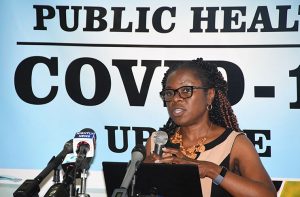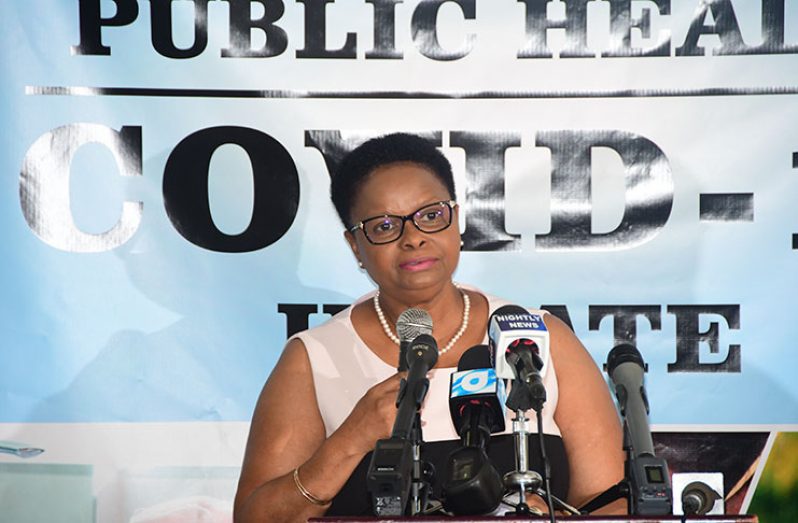-Projections show that Guyana could have some 1,400 cases
By Navendra Seoraj
TWO of the eight persons, who have been diagnosed with the Novel Coronavirus (COVID-19), have been placed in the COVID-19 Intensive Care Unit (ICU), which was established by the Ministry of Public Health (MoPH) in light of the COVID-19 pandemic.
Guyana had confirmed its first imported case of COVID-19 in Georgetown on Wednesday, March 11, 2020.
That patient, a 52-year-old Guyanese woman who had travelled from the United States of America to Guyana on March 5, 2020, was presented to the public health system on March 10. She died at the Georgetown Public Hospital Corporation on March 11. Since then, four of the woman’s relatives have tested positive for the virus.
The total number of confirmed COVID- 19 cases in Guyana had since increased to eight, inclusive of the one death.
“Of the seven persons in isolation two are hospitalised in the COVID-19 ICU units,” said Minister of Public Health, Volda Lawrence, during a press briefing on the local situation regarding COVID-19 at the Police Training Centre, on Monday.
Minister Lawrence did not say whether the persons in isolation were from the initial four cases or from the three new cases because of patient-privacy regulations.

The minister, however, said among the persons infected with COVID-19 are one child, seven adults under the age of 60 years old and one adult over the age of 60 years old. The cases were from three regions, with Region Four (Demerara-Mahaica) having six; and Regions Three (Essequibo Islands-West Demerara) and Six (East Berbice-Corentyne) having one each.
According to Minister Lawrence, of the total confirmed cases, four were imported cases and three were local transmission.
“The number of persons tested, moved from 44-46…eight positive, thirty-seven negative and one inconclusive,” said Minister Lawrence.
Director of Disease Control, Dr. Nadia Liu, explained that an inconclusive case means that the person tested neither negative nor positive. It, however, means that the person can go on to manifest signs and symptoms of the virus and then test positive.
In such cases, health officials will continue to monitor the patient. So far, there are 36 persons in “institutional quarantine,” said Minister Lawrence. Over 170 persons are currently being monitored for COVID-19 and this includes persons under institutional quarantine, home quarantine and institutional isolation.
The COVID-19 pandemic has had a devastating impact globally. As of March 30, the number of confirmed cases in 210 countries and territories stood at 634,835 with the number of deaths at 29,957.
In the region of the Americas, the total number of confirmed cases has increased from 100,314 to 120,798. The number of deaths in this region has also moved from 1,485 to 1,973.
LOCAL PROJECTION
While Guyana has not been hit as hard as some of the other countries in the Americas, the public health ministry, using the Pan American Health Organisation (PAHO)’s model, determined that the number of projected cases for Guyana stands at 1,400.
“Of that number we will be preparing for 100 persons requiring ICU attention, 300 isolation beds and building capacity for 730 beds for institutional quarantine,” said Minister Lawrence.
Considering the projected cases, the public health ministry, in an effort to contain and reduce the spread of COVID-19, will be strengthening community and hospital surveillance, as well as strengthening the capacity of the ministry’s rapid response surveillance team.
Resident PAHO/WHO Representative, Dr. Williams Adu-Krow, in speaking about projections, said, while some institutions have advised countries to plan for 40-80 per cent of its population being infected, the true figure depends on that country’s response.
“Despite what these analysts are saying, the number we will truly get is dependent on our response, if it is bad we will have more cases and if it is good we will have less cases,” said Dr. Adu-Krow.
EARLY DETECTION
Since the detection of the first local case, the public health ministry has ramped up its surveillance and response efforts. And, according to Deputy Chief Medical Officer (DCMO), Dr. Karen Boyle, focus is being placed on early detection of suspected cases.
“We have systems in place for early detection so if anybody develops signs, we would know right away, do the test and look for contacts,” said Dr. Boyle.
The aim of the public health ministry’s surveillance team is to find every case and then track that person’s movement, especially if it’s an imported case.
In explaining the process, Dr. Boyle said: “We have to retrace that person’s steps and go back to immigration, customs, and taxis, people in the home, and even the market and other places where the infected person would have visited.
“The team has a line-listing of cases and contacts… and isolation is being done for confirmed cases and the high risk persons are put on home quarantine…we have eight cases and we are monitoring their contacts.

She said a large number of persons, who are quarantined, will be finishing the14-day monitoring period, but as persons come off quarantine, persons are going in based on the ministry’s hotline. And, Monday, calls to the COVID-19 hotline moved from 856 calls to 998; these calls were received from seven of the ten administrative regions.
According to Dr. Boyle, hotline reports from persons, who were in contact with infected persons, are coming from communities along the coastland, including Enmore and Good Hope on the East Coast of Demerara (ECD) to Prashad Nagar, Straboek and South Ruimveldt in Georgetown. There have also been calls from Diamond on the East Bank of Demerara (ECD) and Vreed-en-Hoop on the West Coast of Demerara (WCD).
Despite the current situation, health officials said persons are not taking the virus seriously but they hope that good sense will prevail.
On Saturday, President David Granger said a “cavalier approach” in the face of COVID-19 pandemic could ‘seriously’ impair government’s efforts to combat the virus, especially now that the cases have moved from five to eight persons.
Such an approach from the public could result in consequences which will be devastating for the entire population, said the president.
“Guyanese, I urge you to continue to support all medical professionals: doctors, nurses, and other caregivers. I urge you also to practise social distancing in public places and to avoid crowds, ceremonies including funerals and large gatherings,” said President Granger.
He also advised persons to remain calm and implement all guidelines relating to personal hygiene and infection prevention and control.
Based on consultations, President Granger had issued directions under the Public Health Ordinance (Cap.145) and international standard to prevent and control the spread of this disease.
Speaking about those instructions, the President said: “I authorised the Minister of Public Health to take all measures considered necessary to restrain, segregate and isolate persons suffering from the disease and, or who may be likely to be suffering from the disease.”
He believes that the public ‘must’ adhere to infection prevention and control measures, as personal conduct is the single most important element in preventing the spread of this deadly disease.
WHO said most people infected with the COVID-19 virus will experience mild to moderate respiratory illness and recover without requiring special treatment. Older persons and those with underlying medical problems like cardiovascular disease, diabetes, chronic respiratory disease, and cancer are more likely to develop serious illness.
WHO believes that the best way to prevent and slow down transmission is to be well-informed about the COVID-19 virus, the disease it causes and how it spreads.
“Protect yourself and others from infection by washing your hands or using an alcohol-based rub frequently and not touching your face. The COVID-19 virus spreads primarily through droplets of saliva or discharge from the nose when an infected person coughs or sneezes, so it’s important that you also practise respiratory etiquette (for example, by coughing into a flexed elbow),” WHO advised.




.png)









